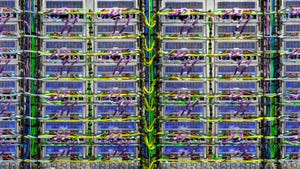Is Colo Going the Way of the Shopping Mall?
Yes, everything IS moving to the cloud, and no, leasing is NOT much cheaper than building

Colo providers and hosting companies that own and operate their own data centers should think hard about diversifying their revenue streams or sell and get out of the business altogether while the going is good.
That’s the advice Zahl Limbuwala, founder and CEO of Romonet, has for these businesses. With few exceptions, they are awaiting the same faith as owners of shopping malls – possession of massive abandoned monstrosities in the suburbs, every once in a while lucky to be repurposed as office buildings.
Why? Because cloud. In a recent blog post, Limbuwala takes every cliché argument for why cloud computing isn’t going to kill the data center market and shoots it down.
Common data center market myths, according to Limbuwala:
Data centers can’t be valued as a property business (any more)
Data centers are not "The Cloud"
The cloud is not your friend it's your competition!
Focus on revenue and growth and it will all be fine
Growth in data centers is a function of the explosive growth in technology, mobile communications, globalization, etc.
My product and my data center business are unique and thus immune to commoditization
Customers will stay despite the costs because moving is hard and costly
For most customers renting space in a data center is cheaper than owning a data center
The surprisingly blunt stream of consciousness titled An ‘open letter’ to data center investors came after Limbuwala spent five years running his business, which is getting up close and personal with the financials of every data center his clients operate, checking its vitals and issuing a prognosis. In fact, the original name of Romonet’s software was Prognose.
And Limbuwala’s prognosis for data center market is dire. As he points out, the data center provider industry’s future is predictable because there have been plenty of past examples. It is simple commoditization. “For the avoidance of doubt, cloud is the commoditization of IT services, nothing more,” he writes.
Now that an application is no longer tied to the piece of hardware underneath, there is very little that prevents its owner from moving it. And there is every incentive to move it into one of the massive Infrastructure-as-a-Service clouds, the likes of Amazon Web Services, Microsoft Azure or Google Cloud Platform.
Whatever complexities of moving an application from one piece of infrastructure to another that were still left with typical hypervisor-based virtualization, companies like Docker are quickly doing away with.
Read Limbuwala's article on the cost of delivering IT services
In a nutshell, because of their scale, a Google or a Microsoft can develop IT management platforms, buy hardware and land and build data centers at a low cost a typical colo or hosting provider could not get close to, much less maintain a healthy margin, Limbuwala writes.
To him, colo is simply a transitory stage between an enterprise data center and the cloud. But even the orthodox tenet that holds that leasing colo space is cheaper than owning a data center is not sacred to Romonet’s CEO.
“For many customers we, and others, have gone through the economics and the simple fact is that somewhere between 500kW and 1MW of capacity it becomes substantially cheaper (from a TCO perspective) to build your own data center than to rent colo,” he writes. Again, commoditization is to blame here, making mechanical and electrical equipment, design and construction a lot cheaper.
Limbuwala did not attempt to forecast a period when the sun is going to start setting on the colocation industry. The piece was meant to warn investors being approached with data center business propositions, he explains.
His final advice to the service providers is to get ready for big change: “Now is the time to look closely at minimizing cost and maximizing margin, being realistic about the reinvestments you need to make versus the risk of not making them. Then at least you give yourself some time to think, decide what outcome you want and how you’re going to get there.”
About the Author
You May Also Like

.jpg?width=300&auto=webp&quality=80&disable=upscale)





